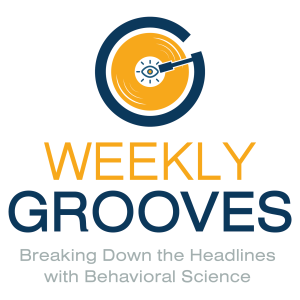
Stories, science and secrets from the world’s brightest thought-leaders. Behavioral Grooves is the podcast that satisfies your curiosity of why we do what we do. Explanations of human behavior that will improve your relationships, your wellbeing, and your organization by helping you find your groove.
Episodes

Wednesday Nov 11, 2020
How Do We Deal with Disinformation?
Wednesday Nov 11, 2020
Wednesday Nov 11, 2020
[NOTE: This episode was originally published under our sister-podcast, Weekly Grooves. We are republishing it here to share relevant behavioral science information. We hope you enjoy it.]
We saw an article in The Atlantic that caught our attention because of its hook into behavioral science: our willingness to believe disinformation. In this week’s episode, we talk about the underlying behavioral science into why we humans are so susceptible to information that is not accurate.
What can we do? We can use the OODA loop to interrupt our too-quick decision to simply accept suspicious content: Observe – Orient – Decide – Act. The OODA loop, in a very simplistic manner uses these four elements in this way: to take in and observe the context in which you’re seeing this information; orient yourself with the source in a critical way; make a decision by asking, “if this is from someone I might not trust, would I still believe it?”; and take action by deleting content created to DIS-inform you.
And since our podcast is relatively new, we are very interested in knowing how you think we’re doing. Please leave us a review or drop us a line. @THoulihan or @WhatMotivates
Disinformation: “False information, which is intended to mislead, especially propaganda issued by a government organization to a rival power or the media.”
Misinformation: “False or inaccurate information, especially that which is deliberately intended to deceive.”
Conspiracy Theory: “A belief that some covert but influential organization is responsible for a circumstance or event.”
© 2020 Weekly Grooves / © 2020 Behavioral Grooves
Links
“The Billion Dollar Disinformation Campaign to Reelect the President,” by McKay Coppins in The Atlantic: https://www.theatlantic.com/magazine/archive/2020/03/the-2020-disinformation-war/605530/
The Donation of Constantine: https://en.wikipedia.org/wiki/Donation_of_Constantine
The National Enquirer: https://en.wikipedia.org/wiki/National_Enquirer
The Daily Mail: https://en.wikipedia.org/wiki/Daily_Mail
The Messenger Effect: https://www.nber.org/papers/w25632.pdf
OODA Loop: https://en.wikipedia.org/wiki/OODA_loop
Leveraging the OODA Loop with Digital Analytics to Counter Disinformation, by Jami Carroll (2019): https://search.proquest.com/openview/0a78c42e27ef89dab1bd4969bd6d0974/1?pq-origsite=gscholar&cbl=396497
Viktor Frankl: https://en.wikipedia.org/wiki/Viktor_Frankl
FactCheck.org: https://www.factcheck.org/
Snopes: https://www.snopes.com/about-snopes/
Gallup Polls Believing in the Media: https://news.gallup.com/poll/267047/americans-trust-mass-media-edges-down.aspx

No comments yet. Be the first to say something!